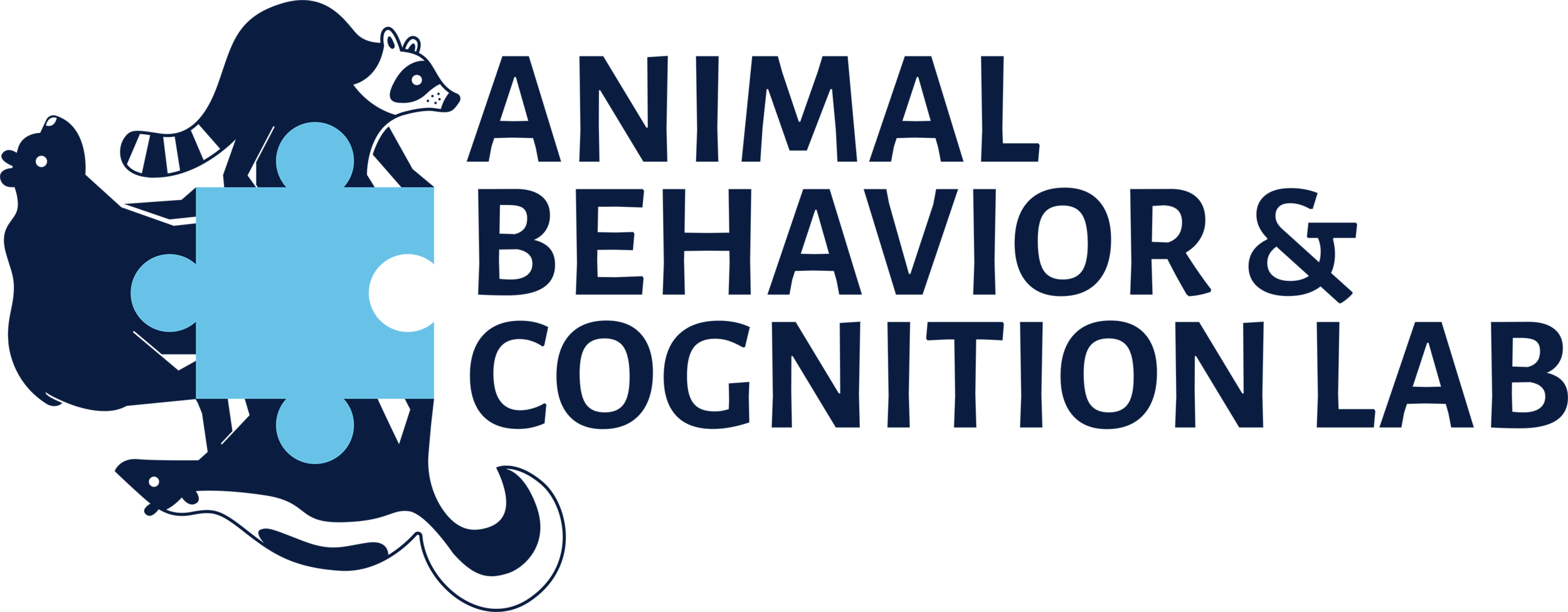Cognition of Urban Adapters
A main goal of our research program with urban carnivores is to determine which cognitive mechanisms facilitate the successful adaptation of some species to human-altered environments.
The cognitive buffer hypothesis posits that the evolution of big brains and advanced cognitive abilities has enabled some species to exhibit more flexible behavioral responses to anthropogenic disturbances and thus enabled more behaviorally flexible and cognitively advanced species to successfully adapt to urban environments. However, it is difficult to study the role cognition plays in the ability of some species to inhabit areas with high levels of anthropogenic disturbance because of challenges associated with assessing cognition in wild animals and with standardizing assessments of cognition both across species and in varying environments. In the past six years, our research group has made substantial progress in using technological advances to test key cognitive abilities of successful urban carnivore species.
Project collaborators
Dr. Amy Gilbert
USDA/APHIS National Wildlife Research Center
Dr. Shylo Johnson
USDA/APHIS National Wildlife Research Center
Dr. Julie Young
Utah State University
Dr. Eli Bridge
University of Oklahoma
Dr. Joost Huizinga
OpenAI
Major findings from this theme
Wild and captive raccoons are highly innovative and behaviorally flexible. We have tested innovative problem-solving and behavioral flexibility in captive raccoons with an Aesop’s Fable task (Stanton et al. 2017), with a multi-access puzzle box (Daniels et al. 2019), and with a reversal-learning task (Stanton et al. 2021). We have tested innovative problem solving and behavioral flexibility in wild raccoons with single and multi-solution puzzles boxes (Stanton et al. in prep) and with a reversal-learning task (Stanton et al. in review). To test wild raccoons we have designed an individualized, adaptive, and automated testing device using RFID technology.
Raccoons, striped skunks, and coyotes are all very successful at living in cities, but they seem to have different strategies in how they approach and manipulate man-made objects. However, they all learn the solution to a novel problem at a similar rate. In Stanton et al. 2021, we presented captive raccoons, skunks, and coyotes with a reversal-learning task. Raccoons completed the most trials and were successful in fewer trials than the other species. In fact, most raccoons solved the problem on their first night of testing! Only one coyote out of 6 that were tested approached and engaged with the problem, and it took this coyote over 50 nights of consecutive testing to solve the problem for the first time. However, once the coyote was willing to work with the device, it learned at the same rate as the other species.
Captive raccoons trade-off between exploring new solutions and exploiting known solutions to a problem as the difficulty of the problem changes. In Griebling et al. (in preparation), we presented captive raccoons with a multi-access puzzle box that had three different solutions, all of which remained unlocked and available throughout testing. We asked whether raccoons would continue to explore and open new solutions even when their preferred solution remained available to them. We found that they did. We then asked whether this tendency to explore new solutions versus exploit known solutions would change as the solution difficulty increased. We tested raccoons with a box that had three easy solutions, then three intermediate solutions, and then three difficult solutions. Raccoons explore more when the solutions are easy, and exploit more when the solutions are difficult.
A Science Friday video talking about our research on urban raccoon cognition.
Media coverage
BBC Newsday: Meet the raccoons that solved an ancient puzzle
National Geographic: Raccoons Pass Famous Intelligence Test—By Upending It
IFLS: Rebel Raccoon Solves Ancient Greek Puzzle In Entirely Unexpected Way
Wyoming Public Media: New Study Pits Laramie Raccoons Against An Ancient Greek Fable
LiveScience: Raccoons Ace Cognition Test (But Sometimes They Cheat)
Science Daily: Raccoons solve an ancient puzzle, but do they really understand it?
Also featured as one of the stories in the SigmaXi Smart Brief
Featured publications
Stanton L, Davis E, Johnson S, Gilbert A, Benson-Amram S (2017) Adaptation of the Aesop’s Fable paradigm for use with raccoons (Procyon lotor): considerations for future application in non-avian and non-primate species. Animal Cognition 20(6). doi:10.1007/s10071-017-1129-z.
Daniels S, Fanelli R, Gilbert A, Benson-Amram S (2019) Behavioral flexibility of a generalist carnivore. Animal Cognition 22(3):387–396.
Stanton LA, Bridge E, Huizinga J, Johnson S, Young J, Benson-Amram S. (2021) Variation in reversal learning by three generalist mesocarnivores. Animal Cognition:1–14.
Stanton L, Bridge E, Huizinga J, Benson-Amram S. In review. How environmental, individual, and social traits of free-ranging raccoons (Procyon lotor) influence participation and performance in cognitive testing. Journal of Experimental Biology
Griebling H, Johnson S, Gilbert A, Benson-Amram S. In preparation. Exploratory problem solving in raccoons.
Stanton L, Fanelli R, Holst E, Cooley C, Benson-Amram S In preparation. Innovative problem solving and behavioral flexibility in wild raccoons.

